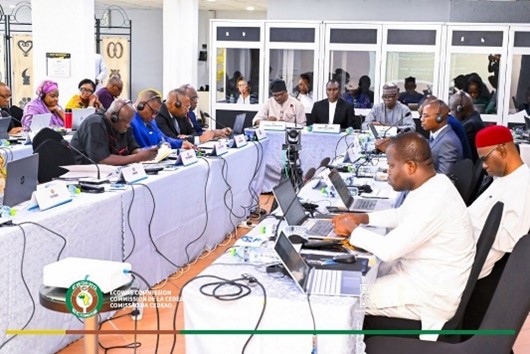The Economic Community of West African States (ECOWAS) convened the 16th Consultative Meeting of the Regional Committee for Disaster Management in West Africa (GECEAO) in Accra, Ghana, from May 20th to 22nd, 2025. This crucial meeting brought together heads of disaster management and civil protection agencies from across the ECOWAS member states to address the escalating challenges of disaster risk reduction and humanitarian response in the region. The meeting, organized by the ECOWAS Directorate of Humanitarian and Social Affairs (DHSA), focused on reviewing regional strategies, strengthening coordination, and enhancing resilience-building efforts. The backdrop of the meeting was the stark reality of significant disaster-related losses exceeding a billion dollars over the past 25 years in West Africa, underscoring the urgent need for collaborative and proactive measures.
The opening remarks highlighted the multifaceted nature of disaster risks in the region. Dr. Mohammed Ibrahim, representing the DHSA, emphasized the impact of environmental degradation, rapid urbanization, and climate change on the increasing frequency and intensity of disasters. He urged member states to prioritize humanitarian assistance and invest in proactive resilience-building programs, collaborating with partners to effectively mitigate these evolving challenges. The escalating vulnerability of West Africa to floods, droughts, epidemics, and conflicts, which threaten lives and undermine development gains, was a recurring theme, further emphasizing the criticality of regional cooperation and resource sharing.
ECOWAS has committed to a proactive Humanitarian Response Initiative for 2025, aiming to reach over 600,000 individuals with programs focused on food security, displacement assistance, water, sanitation and hygiene (WASH) services, healthcare, and early recovery support. This initiative underscores the region’s commitment to not only responding to immediate needs but also strengthening regional preparedness, emergency response coordination, and the adoption of new technologies to ensure efficient and dignified aid delivery. Nigeria’s representative, Alhaji Idris Mohammed, stressed the urgency of cooperation and collaboration, advocating for a unified approach to disaster management across the sub-region. He highlighted Nigeria’s commitment to capacity building through training programs for disaster management professionals, partnering with universities to offer specialized courses in disaster and development studies, and emphasized their willingness to share expertise and resources with other ECOWAS member states.
Alhaji Mohammed further underscored the importance of building on past successes and strengthening partnerships to create a more resilient West Africa. This sentiment was echoed by other participants, recognizing the value of collective experience and knowledge sharing in addressing the complex challenges of disaster management. The collaborative approach promoted at the meeting recognizes that no single nation can effectively address these multifaceted challenges alone, and that a unified front, leveraging the strengths and experiences of each member state, is crucial for success.
Ghana, as the host nation, showcased its commitment to disaster risk reduction through recent legislative reforms empowering its National Disaster Management Organization (NADMO). Major (Rtd.) Dr. Joseph Bikanyi Kuyon, Chairman of GECEAO and Director General of NADMO, announced the development of a national Disaster Risk Financing Strategy, further highlighting Ghana’s proactive approach. He stressed the importance of capacity building and urged participants to leverage their expertise to inform policy development and ensure impactful resource allocation. His call for the integration of disaster risk reduction into national development plans reflects a forward-thinking approach to embedding resilience at the core of development strategies.
The Accra meeting underscores the recognition that disaster management is not solely a reactive endeavor but requires proactive planning, investment, and regional coordination. The call for the translation of regional hydro-meteorological warnings into tangible preparedness and mitigation actions highlights the importance of actionable intelligence and preemptive measures. The meeting served as a critical platform for strategic dialogue, knowledge exchange, and fostering regional solidarity, with ECOWAS member states committing to a collaborative approach in confronting the growing disaster risks and protecting vulnerable communities throughout West Africa. The shared vision articulated at the meeting is one of a harmonized and resilient West Africa, capable of effectively anticipating, responding to, and mitigating the impacts of disasters through collaborative action, robust capacity building, and a shared commitment to protecting its citizens.


